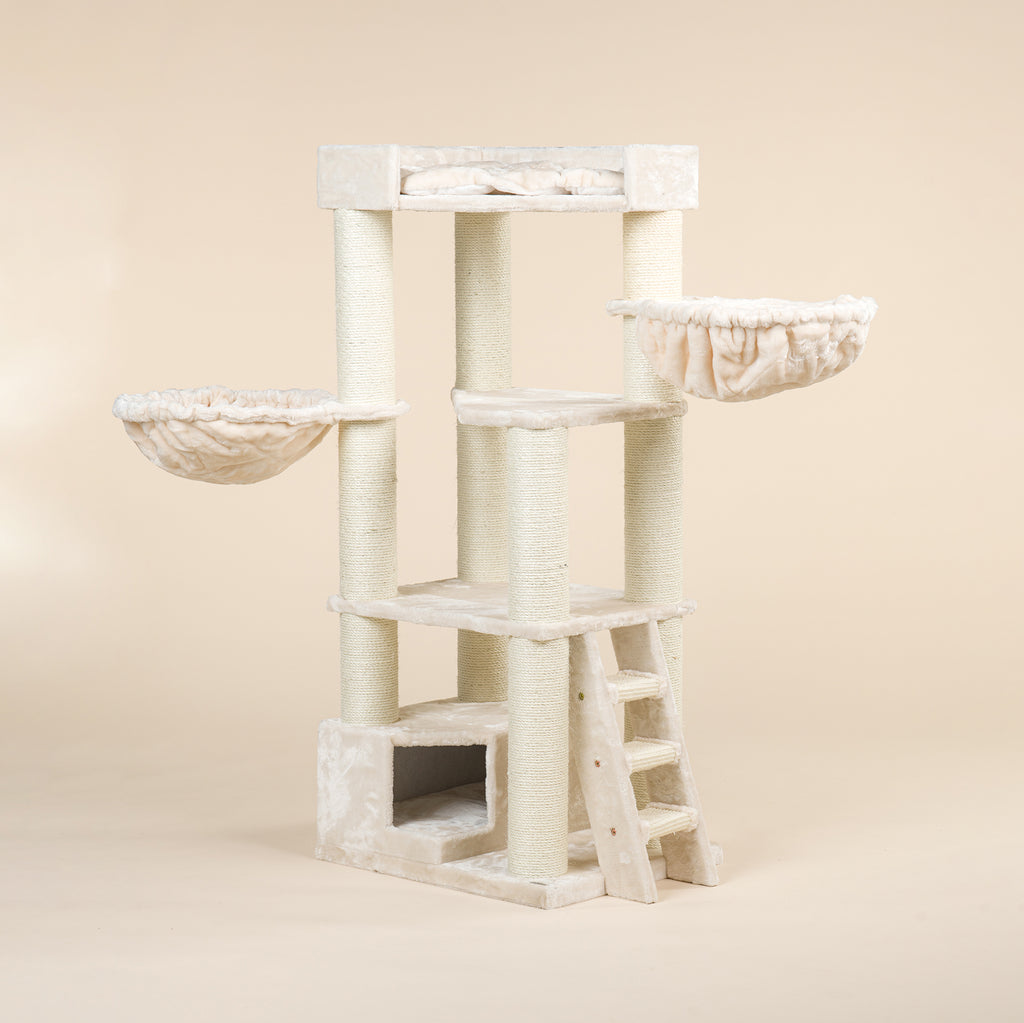Fortunately, there are several ways to help your cat adjust to a new environment.
Fortunately, there are several ways to help your cat adjust to a new environment.
Here are 5 tips to help your cat adjust to a new environment:
There are many ways to support your cat, but maintaining familiar routines and providing a safe space are really the foundation. It is very important to regularly monitor your cat's behavior and health.
Lily is now adjusting well to our new house. She still seems a bit cautious at times, but that is improving day by day. We bought the Royal Cat Palace because we have the space for it, but decided to keep her Corner Coon for the first few months so she had something familiar. It has become her favorite spot in the new house. Now we were ready to switch to the Royal Cat Palace and she quickly got used to it. Some say it is too big, but it is also a real eye-catcher. Everyone who visits us asks where we got this particularly luxurious cat tree from. We are very satisfied with it and are now considering purchasing another model for the second floor. This way, Lily also has her own comfortable spot higher up.
Cats are naturally curious creatures, always ready to explore their surroundings and eager to claim new areas as their own territory. However, even the most adventurous cat can hesitate a little when it comes to accepting a new piece of furniture in their domain, such as the RHRQuality cat tree. This majestic tower of comfort and fun, designed with the cat's needs in mind, may initially be met with some suspicion or even outright avoidance. But fear not! This is a common scenario and there are several strategies to help your cat embrace their new RHRQuality cat tree.
First of all, it is important to understand that a cat tree is not just a piece of furniture. For our furry friends, it is a territory, a lookout point, a cat tree, and a place to rest and play. It is part of their world and it is essential that it feels safe, familiar, and interesting. When we introduce a new cat tree into their environment, it is natural for a cat to feel a bit uncomfortable. The cat tree is a new element in their territory, it smells different, looks unfamiliar, and your cat may not immediately understand how to use it. But with the right approach, you can help them overcome these initial doubts and make their RHRQuality cat tree their new favorite spot.
How can you help your cat adjust to their new RHRQuality cat tree? There are various strategies you can use, ranging from choosing the right location for the cat tree to selecting a cat tree that suits your cat's preferences and using positive techniques such as treats, toys, and interaction. Let's take a closer look at these different ways...
Location is important: Cats prefer certain areas in the house. If you place the cat tree in a spot they rarely visit, it may prevent them from enjoying their new cat tree. Cats are observant and usually want to visit the areas where the rest of the family is active. However, if your cat likes to hide and stay away from foot traffic in the house, try placing the cat tree in one of their most visited rooms or comfortable spots in the house. Most cats love windows, so it can also be a good idea to place the cat tree near a window.
Choose the right cat tree: The cat tree you choose should match your cat’s preferences and needs. For example, if you have multiple cats in the house, you might need a larger cat tree or more than one cat tree. The cat tree should also suit your cat’s scratching and height preferences. Some cats like to be high up, while others prefer to stay closer to the ground.
Also consider how active your cat is. Very active cats may enjoy a cat tree with toys, resting places, ladders, scratching boards, and more. If your cat is less active, it’s better to choose a cat tree that focuses more on comfort and lounging. The age and health condition of the cat should also be taken into account. Young kittens or older cats with mobility issues may do better with a cat tree that is lower to the ground and easier to access.
Use treats, toys, or catnip: These can make the cat tree more inviting. You can leave a trail of treats leading to the cat tree, choose to let them eat a tasty meal there, or even play while incorporating the cat tree. Catnip is also a very enticing option that can give the cat tree a good first impression:
Positive attention is key when it comes to cats. Take the time to place your cat on the cat tree and give them pets, love, and affection. If you have a playful cat, grab the toys and let them play. You can even use a laser and have them chase it all over the cat tree.
We are constantly looking for new furry friends! Would you also like to have your story read here? Then do not hesitate to let us know, who knows, we might send you a message.
We can hardly wait! Click the link below and fill in the questions!





